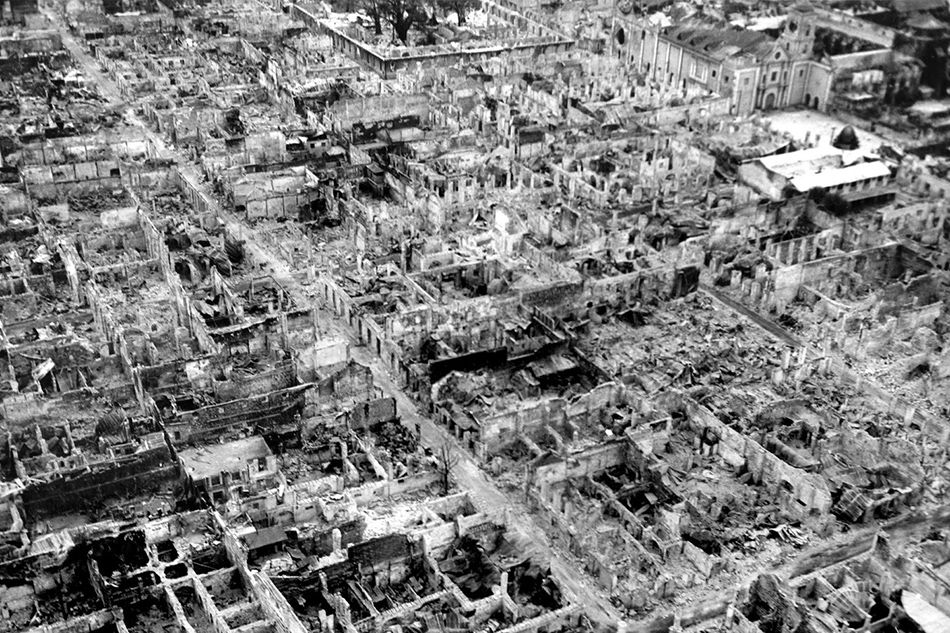'Biggest tragedy': American historian looks back at World War 2's impact on Manila | ABS-CBN

Welcome, Kapamilya! We use cookies to improve your browsing experience. Continuing to use this site means you agree to our use of cookies. Tell me more!
'Biggest tragedy': American historian looks back at World War 2's impact on Manila
'Biggest tragedy': American historian looks back at World War 2's impact on Manila
ABS-CBN News
Published Feb 11, 2019 05:48 PM PHT
|
Updated Feb 11, 2019 06:15 PM PHT
MANILA - The month-long battle to liberate Manila from Japanese forces in 1945 was unlike all other battles that American forces dealt with in the Pacific, an American historian said Monday.
MANILA - The month-long battle to liberate Manila from Japanese forces in 1945 was unlike all other battles that American forces dealt with in the Pacific, an American historian said Monday.
James Scott, author of "Rampage: MacArthur, Yamashita and the Battle of Manila" also said the destruction wrought on the Philippine capital during the war completely changed it.
James Scott, author of "Rampage: MacArthur, Yamashita and the Battle of Manila" also said the destruction wrought on the Philippine capital during the war completely changed it.
Scott said around 100,000 civilians were killed in the Battle of Manila, which gave American forces a taste of urban warfare.
Scott said around 100,000 civilians were killed in the Battle of Manila, which gave American forces a taste of urban warfare.
"It was a battle in which American soldiers, up against the Japanese, had to go block by block, home by home, and even room by room," Scott said in an interview with ANC.
"It was a battle in which American soldiers, up against the Japanese, had to go block by block, home by home, and even room by room," Scott said in an interview with ANC.
ADVERTISEMENT
Japanese soldiers systematically torched Manila's neighborhoods and killed civilians, while American forces fired 42,000 artillery rounds while retaking Manila.
Japanese soldiers systematically torched Manila's neighborhoods and killed civilians, while American forces fired 42,000 artillery rounds while retaking Manila.
A blurb from the book said: It was harder to tell who had done more damage, the Japanese defenders or the American liberators.
A blurb from the book said: It was harder to tell who had done more damage, the Japanese defenders or the American liberators.
But Scott said while American's concentrated their artillery on occupied Intramuros and on government buildings, the Japanese under military commander Sanji Iwabuchi systematically committed atrocities such as chaining people inside buildings before setting them on fire, decapitating hundreds of men and raping women.
But Scott said while American's concentrated their artillery on occupied Intramuros and on government buildings, the Japanese under military commander Sanji Iwabuchi systematically committed atrocities such as chaining people inside buildings before setting them on fire, decapitating hundreds of men and raping women.
When the Americans finally liberated Manila on March 3, 1945, a hundred thousand civilians lay dead.
When the Americans finally liberated Manila on March 3, 1945, a hundred thousand civilians lay dead.
This, Scott said, was the war's biggest impact on Manila--the loss of human capital.
This, Scott said, was the war's biggest impact on Manila--the loss of human capital.
ADVERTISEMENT
"Think of how many families were wiped out-- doctors, lawyers, inventors, judges," Scott said.
"Think of how many families were wiped out-- doctors, lawyers, inventors, judges," Scott said.
"It was that priceless human capital that really was one of the biggest tragedies."
"It was that priceless human capital that really was one of the biggest tragedies."
Scott is touring the Philippines to promote "Rampage." The book will be formally launched on Tuesday Feb. 12 at the Filipinas Heritage Library in the Ayala Museum, Makati.
Scott is touring the Philippines to promote "Rampage." The book will be formally launched on Tuesday Feb. 12 at the Filipinas Heritage Library in the Ayala Museum, Makati.
Read More:
history
World War II
Battle of Manila
Douglas MacArthur
Iwabuchi
Yamashita
Filipinas Heritage LIbrary
ANC
ANC Top
ANC Exclusives
ADVERTISEMENT
ADVERTISEMENT


